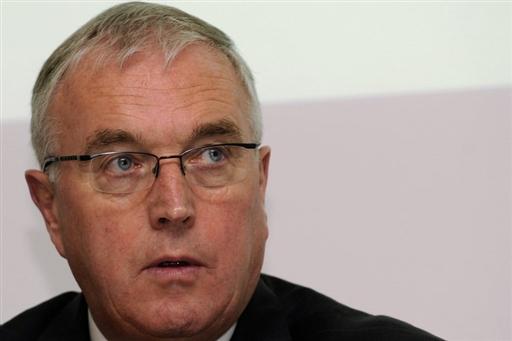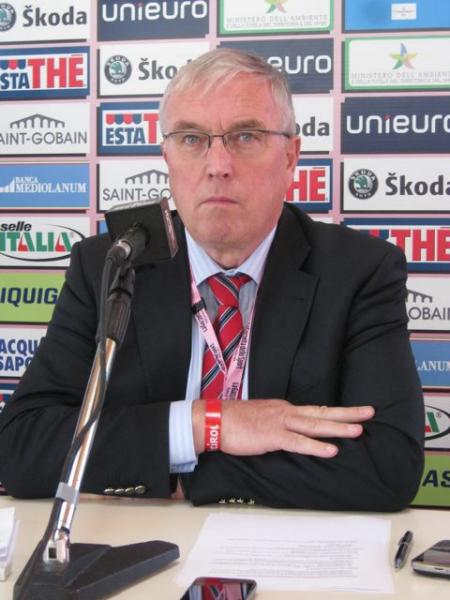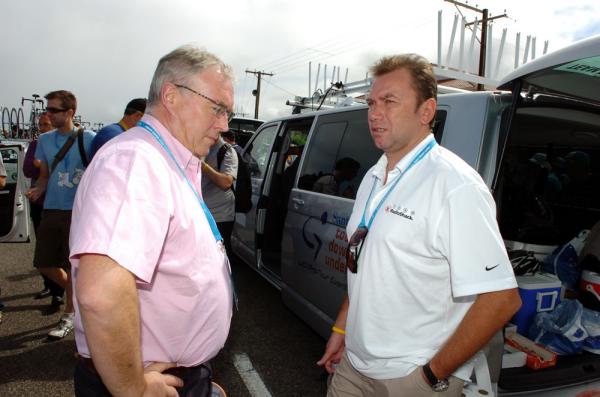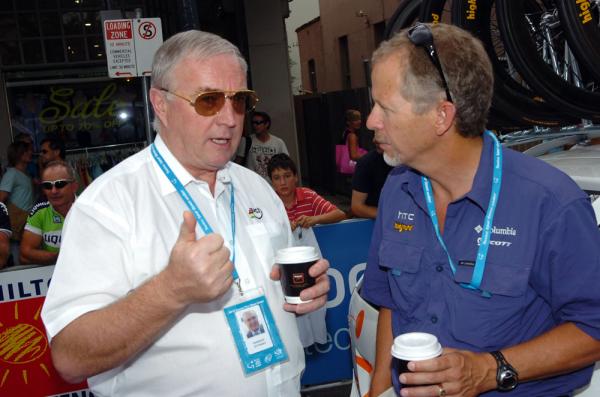McQuaid defends UCI against Landis and Bordry
UCI President confirms the Armstrong donation was $100,000




International Cycling Union President Pat McQuaid has responded aggressively to two recent criticisms of the UCI: those made by Pierre Bordry, the head of the French Anti-Doping Agency regarding the effectiveness of the UCI's doping controls and accusations made by Floyd Landis that the previous president accepted a bribe to cover up a positive doping control.
McQuaid described Bordry's accusations on German television that UCI ant-doping controls at the Tour de France were 'predictable and ineffective' as "pure bullshit".
Speaking to Cyclingnews from Edinburgh, where he will make the opening keynote speech at the first edition of the Cycling Science Conference on Thursday, McQuaid insisted there was no discrepancy in the amount donated to the UCI by Lance Armstrong - something skeptics used to fuel speculation that the money was actually a payoff.
"$100,000 is the figure and the receipt is available for anyone to see at the UCI headquarters in Aigle," McQuaid told Cyclingnews.
"I know that Lance said he thought that the figure was $25,000 but that could be because the UCI was actually dealing with Lance's manager Bill Stapleton. Regarding the figure suggested by Sylvia Schenk, that's figure she's just picked from the air. The real amount is $100,000."
McQuaid said he would be willing to testify in a possible US Federal investigation into the Landis accusations, but claimed he would have little to say. He said there is no need for an independent investigation into Landis accusations because they are already being investigated.
"I'd go anywhere to testify on what I know, even though I don't know what jurisdiction there might be on the UCI," McQuaid told Cyclingnews.
Get The Leadout Newsletter
The latest race content, interviews, features, reviews and expert buying guides, direct to your inbox!
"We actually know very little because the only doping information we get is when a lab tells us there's been a positive test and then we follow the rules."
"The USADA (United States Anti-Doping Agency) and the other anti-doping agencies in Australia and Canada are investigating Landis' accusations. They're independent and so there's no need for another investigation. If they come up with proof, we'll take action but I think we should let them do their work. We're not trying to hide anything and we're not avoiding the issue but all this raking up the past is not doing the sport any good."
"There's something going on in the row between Greg LeMond and Lance Armstrong. It's being fueled by LeMond helping Landis and by information being fed to the media. That's completely unfair and we should let the authorities do what they have to do. The sport of cycling has changed massively since 2006 and moved on. Young riders deserve our support and shouldn't have to compete under all this suspicion."
"Landis is just bitter and is claiming that all these guys doped because he got caught doping and thinks that other people got away with it. He thinks he was selected to be caught but he denied doping for four years and now he's saying the total opposite. I don't think he's believable."
Bordry accusations
In response to Pierre Bordry's accusations, McQuaid revealed details of the number of out of competition tests the UCI will carry out before this year's Tour de France. He revealed that the UCI may take legal action against Bordry.
"We're studying the legal implications because it's not right that he makes generalised and totally unfounded accusations like that. He's being mischievous and just trying to do damage to cycling, especially by speaking on German television."
"He's accused us of not doing enough tests and says that the riders know in advance when they will be detected but that's pure bullshit."
"I can reveal that the numbers tell another story. In 2007 we did 1500 out of competition tests: 1000 urine and 500 blood. In 2009 we did 9000: 2500 urine tests and 6500 blood tests. That's 25 a day. The AFLD did just 389 out of competition blood tests across all sports disciplines in France in the whole of 2009."
"It's true that the French did the CERA tests but in 2008, when they were in charge of the tests for the Tour de France, they did just 70 out of competition tests before the race. For 2010 we've been given the long list of riders entered for the Tour de France by ASO and each rider will face an average of two blood and two urine tests prior to the race. A group of 50 high-profile riders, such as overall favourites and potential stage winners, will face even more testing."
"All that testing will also help us better target riders and go after anyone who's values look unusual. If riders know when they might be tested its because they know they will be tested, before and after the stages and in the evening."
McQuaid replied to Bordry's criticism of the UCI's standards by suggesting that the AFLD does not always follow anti-doping protocols.
"Bordry needs to learn the rules of anti-doping and follow them," he said. "The AFLD has tested riders four times this year when they were not required to do so. The last was just last Friday. They went to test riders from RadioShack who were riding the Dauphine Libere but when they presented a list to the directeur sportif Alain Gallopin, it included the name of a mechanic and a soigneur. How bad is that?"
"Bordry is clearly not in a position to criticize anyone else. He should shut up and let cycling look after it's anti-doping. He seems out to just damage the sport or is looking for publicity and funding."

Stephen is one of the most experienced member of the Cyclingnews team, having reported on professional cycling since 1994. He has been Head of News at Cyclingnews since 2022, before which he held the position of European editor since 2012 and previously worked for Reuters, Shift Active Media, and CyclingWeekly, among other publications.